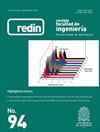建筑物的夜间空调采用外部通风
IF 0.5
Q3 ENGINEERING, MULTIDISCIPLINARY
Revista Facultad De Ingenieria-universidad De Antioquia
Pub Date : 2018-05-04
DOI:10.19053/01211129.V27.N48.2018.8071
引用次数: 4
摘要
建筑包含了几乎所有人类活动发生的环境,因此,如今,它们代表了一个巨大的能量池。在这些建筑内建立热舒适条件是其能源需求的很大一部分。本文旨在为室外通风夜间空调的性能和研究与实施趋势提供一个理论框架。在学术目录Scopus中进行文献检索,在VOSviewer软件中对提取的信息进行处理,通过文本挖掘、术语图和调查行动网络进行检索。文献表明,在昼夜温差较大的地区,直接通风具有更显著的降温潜力。夜间降温的有效性和热行为的可靠预测与对流算法所采用的模型密切相关。对流传热的可靠预测需要一种基于流体动力学计算模拟的方法,与模拟能量流随时间变化的变化相比,这种方法在计算能力方面要求更高。大多数研究表明,热质量的位置并不重要,而通风量则非常重要。特别是,如果空气流量增加,冷却建筑物的能源需求会急剧减少。本文章由计算机程序翻译,如有差异,请以英文原文为准。
Night air conditioning of buildings by external air ventilation
Buildings contain the environment in which almost all human activities take place, and therefore, nowadays, they represent a great sink of energy. Establishing thermal comfort conditions within these buildings is responsible for a large portion of their energy demand. This paper aims at providing a theoretical framework of the performance and the trends in research and implementation of night air conditioning by outside air ventilation. The bibliographic search was conducted in the academic directory Scopus, and the information extracted was processed in the VOSviewer software, through which text mining, map of terms and networks of investigative action were carried out. The literature showed that direct ventilation has a more significant cooling potential in regions characterized by a high difference between day and night air temperatures. The effectiveness of night cooling and the reliable prediction of thermal behavior are strongly related to the model adopted for the convection algorithm. A reliable prediction of heat transfer by convection requires an approach based on computational simulations of fluid dynamics, which are much more demanding in terms of computational power, compared to simulations of the variation of energy flows as a function of time. Most studies showed that the position of the thermal mass is not significant, while the amount of ventilation air is of great importance. In particular, the energy demand for cooling a building decreases sharply if the air flow rates increase.
求助全文
通过发布文献求助,成功后即可免费获取论文全文。
去求助
来源期刊
CiteScore
2.00
自引率
0.00%
发文量
27
审稿时长
2 months
期刊介绍:
Revista Facultad de Ingenieria started in 1984 and is a publication of the School of Engineering at the University of Antioquia.
The main objective of the journal is to promote and stimulate the publishing of national and international scientific research results. The journal publishes original articles, resulting from scientific research, experimental and or simulation studies in engineering sciences, technology, and similar disciplines (Electronics, Telecommunications, Bioengineering, Biotechnology, Electrical, Computer Science, Mechanical, Chemical, Environmental, Materials, Sanitary, Civil and Industrial Engineering).
In exceptional cases, the journal will publish insightful articles related to current important subjects, or revision articles representing a significant contribution to the contextualization of the state of the art in a known relevant topic. Case reports will only be published when those cases are related to studies in which the validity of a methodology is being proven for the first time, or when a significant contribution to the knowledge of an unexplored system can be proven.
All published articles have undergone a peer review process, carried out by experts recognized for their knowledge and contributions to the relevant field.
To adapt the Journal to international standards and to promote the visibility of the published articles; and therefore, to have a greater impact in the global academic community, after November 1st 2013, the journal will accept only manuscripts written in English for reviewing and publication.
Revista Facultad de Ingeniería –redin is entirely financed by University of Antioquia
Since 2015, every article accepted for publication in the journal is assigned a DOI number.

 求助内容:
求助内容: 应助结果提醒方式:
应助结果提醒方式:


